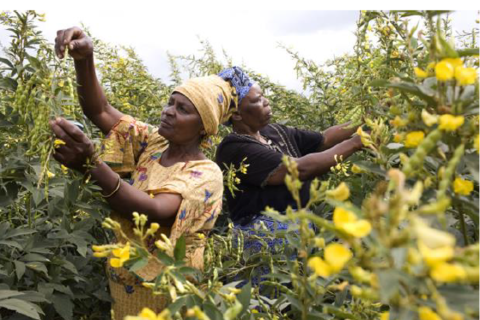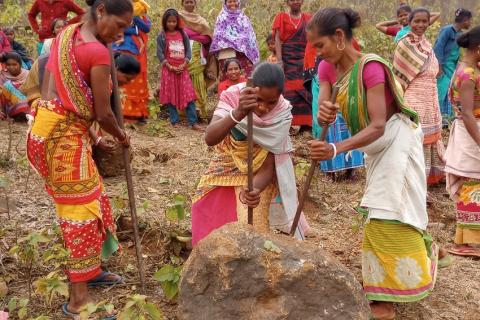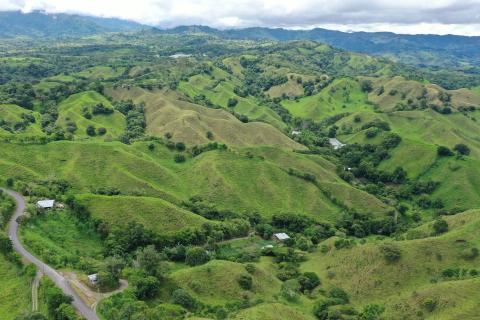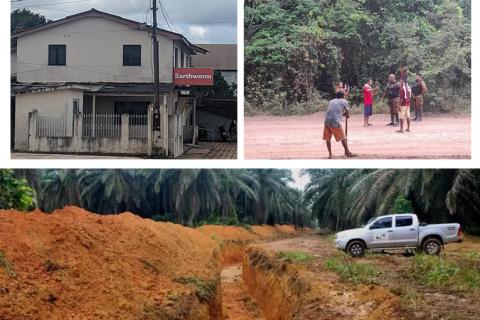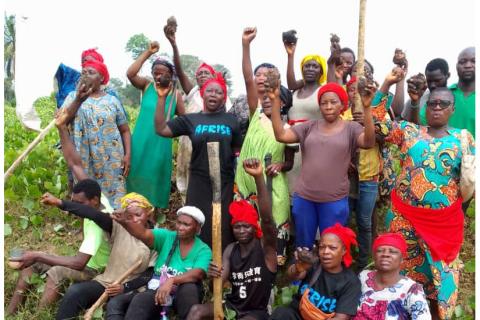Two Joghban leaders who have been active in the fight against Equatorial Palm Oil's (EPO) invasion of their ancestral lands talk about their victorious resistance process. Their resistance culminated in 2018 with official state recognition of part of their territory. However, they stress that this long-term struggle is ongoing. “We are going to resist; we will always resist, because land matters to us and to our future generations”, says Isaac Banwon, one of the leaders.
Bulletin articles
The Tropical Forest Forever Facility (TFFF) will be launched at the 30th United Nations Climate Conference (COP30), which will take place from November 10th to 21st in Belém, Brazil. This initiative claims to be a "new hope" for tropical forests worldwide. However, this is far from the case.
The article we recommend shares the story of Uma Bai Netam, a woman from the Gond tribe in India. It helps us understand how women from traditional communities are particularly affected by commercial tree monocultures – which are allegedly used to offset the destruction of forest areas caused by extractive or infrastructure projects. Uma and other Indian women have won some partial victories, such as the legal right to the land where they have lived and worked for decades.
In recent years, 'energy' has taken center stage at important debates around solutions to the impending climate collapse towards which the world is heading. This debate encompasses everything from the 'energy transition' and 'clean energies,' to structural critiques that question why and for whom energy is produced. However, it is necessary to take a step back and reflect on the very idea of 'energy.' This edition of the WRM bulletin aims to contribute to that reflection.
The root of the climate crisis we are experiencing does not lie in the sources of energy we use but in the very logic of what we mean by 'energy.' While it is hard to imagine this today, the notion of energy has not always existed. It was created for a very specific purpose: capital accumulation. As long as we continue to normalize 'energy' as an essential resource for human life, we will never see the true causes of the climate collapse we are experiencing: a social system designed to concentrate wealth.
The following excerpts are from conversations we had with people who, despite living on different continents, have made the same choice: to live without electricity. Whether they live in the Indonesian archipelago or the Brazilian Amazon, their testimonies show that electricity is not an essential resource for human life. On the contrary, for these people, it is essential to do without it.
Food sovereignty cannot be achieved in isolation from energy sovereignty. Our vision on energy is one that honors the rhythms of nature, values the wisdom of elders and restores the balance between humans and the Earth. Because in traditional African cosmologies, energy was not separate from life. The fossil-fuel era broke this balance, severing energy from ethics, and turning it into a commodity to be bought and sold.
"People need to consider what they truly want; they shouldn’t rely solely on schemes or incentives. Here, we do not depend on electricity or solar power for irrigation. Since the time of our ancestors, we have relied on rain and rivers, and we must rekindle that connection”, explains Sunita Paharia, a villager from the Rajmahal Hills. In this part of India, communities with a long history of resistance against the expropriation of their ancestral territory are rebuilding their autonomy and future.
Our community of Caisán, in Panama, is living proof that it is possible to stand up to an exclusionary hydroelectric development model and its harmful impacts. Through community organizing, we stopped the construction of hydroelectric dams that were being promoted as part of the Plan Puebla Panama – one of the largest development and integration projects of Latin America. Today, we are moving forward with the construction of a fair and community-based energy model.
WRM Bulletin 274 included an article on the work of the Earthworm Foundation, entitled: ‘NGOs at the service of plundering territories: the Earthworm Foundation case’. It describes how corporations which are causing conflict in the territories where they operate profit from cooperation with groups like Earthworm Foundation, while violence against community activists, landgrabs and sexual assaults of women continue.
How does one rebuild community ties and the “energy-joy” in communities whose territories have been devastated by predatory projects? The following text presents the proposal of the Environmental Clinic, a project that was created to help heal peasant and indigenous communities on the border between Ecuador and Colombia, whose social fabric was destroyed mainly by oil extraction projects. The 'Huipala Proposal' presents a way for these communities to move toward their utopias and recover the “energy-joy” of living, after suffering the traumas of territorial and social expropriation.
Across the global South, communities that oppose corporate control of their territories face not only corporate violence but also tear gas, batons and state repression. Challenging the expedient misinterpretation of “all land belongs to the State” that governments use to protect corporate interests, communities stand strong in the struggle to reclaim their ancestral lands “because it is a sacred place; it is a place that gives meaning to our existence.”






